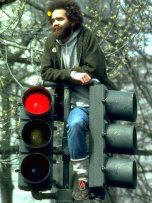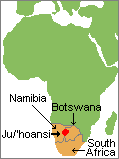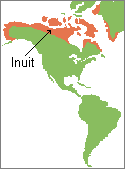Law
Social control entails rules of behavior that
should be followed by the members of a society. Some of the rules of
conduct fall into the realm of good manners as the culture defines them.
As such they describe behavior that is socially desirable but not
necessarily compulsory. Other rules of conduct are not optional
and are enforced by laws. In complex, large-scale societies, laws are
usually written down formally so that they can be known clearly to everyone.
This is not the case with laws in small-scale societies such as those of
foragers, pastoralists, and horticulturalists. Their laws commonly are
much more informal, being rarely written down. Since they are part of
the evolving oral tradition that is familiar to members of these societies,
there is no need to explain them to anyone. However, people visiting
from other societies are not likely to know what the laws are until there is
a dispute.
How laws come about varies. In small-scale societies, they usually evolve over time and are part of the cultural tradition. These are referred to as common laws. In large-scale societies, many laws derive from old common laws that are now formalized by being written down in penal codes. Other laws in these complex societies do not evolve organically but are created by enactment in legislatures or by rulers. These may or may not be codifications of existing social norms. Those laws that parallel the existing norms usually are more likely to be accepted and followed without coercion.
It is not uncommon for some laws to be confusing because they are inconsistent or open to interpretation in different situations. Murder laws in the United States provide an example. Killing another individual is considered to be a serious crime except when it is done in self-defense or in battle during a war. When it is defined as a crime, there can be mitigating circumstances that lessen the seriousness of the crime. U.S. state legal codes commonly make a distinction between murder in the 1st, 2nd, and 3rd degree. In addition there can be 1st and 2nd degree manslaughter. The age and mental state of the killer are often also extenuating circumstances. Some states consider advising or aiding in suicide as being a crime. Killing certain classes of people, such as law enforcement officers, often calls for a harsher sentence as does murder with a gun in the act of committing another crime. The killing of a pregnant woman is considered murder, but the simultaneous killing of her unborn child is not necessarily murder. This is because American society today is divided on the understanding of when human life legally begins.
Crimes and disputes are rarely simple matters in any society. Laws may be open to interpretation, and there often is a difference of opinion about the evidence. Even when guilt is established, there can be a difference of opinion about the appropriate punishment or terms of settlement. Because these issues are open to differing conclusions, most societies settle legal cases by the agreement of the entire community or a representative sample of it. Jury systems around the world usually are based on this idea. The assumption is made that jurors will come to an understanding that would be acceptable to a "reasonable man." In most societies in the past, the "reasonable man" was thought to be just that, a man. Women and children were not thought to be reasonable, nor were uneducated poor men. Subsequently, they were excluded from being jurors and judges. This is still the situation in some of the more traditional societies of the Middle East and some other regions.
Law is by no means the only method for controlling the behavior of deviant individuals. People who violate norms can be subjected to gossip, public ridicule, social ostracism, insults, and even threats of physical harm by other members of their community. These kinds of informal negative sanctions are very effective in small-scale societies. In larger societies, this method also works effectively in small towns and sub-groups of cities, such as a family, work group, church, or club.
In some societies, social control involves the threat of supernatural punishment from the gods or ancestral spirits for deviation from the norm. Since it is assumed that crimes against other people in these societies are likely to be punished whether they are publicly known or not, this belief in divine retribution provides a powerful tool for getting people to behave properly. The possibility that others could use witchcraft against deviant individuals also is a common effective coercive mechanism for bringing people into line, especially in small-scale non-western societies.
Some societies emphasize the use of positive sanctions to reward appropriate behavior rather than negative ones to punish those who do not conform to the social norms. Common positive sanctions include praise and granting honors or awards. Simply receiving the esteem of one's peers is often sufficient motivation for people to be model citizens. Examples of effective positive sanctions in the United States include such things as military promotions, ticker-tape parades, and receiving good grades in school. In order to be effective, a positive sanction does not need to offer an immediate reward. It can be a supernatural reward following death. The Judeo-Christian and Moslem belief that entry into heaven must be earned by a life of good behavior is an example. Similarly, the Hindu and Buddhist belief that a good life results in being reborn at a higher level of existence is a promise of a future supernatural reward.
Some norms in every society usually can be ignored without fear of punishment. Being a loner or dressing oddly are examples of such minor deviations from the norms in North America today. Individuals who do these things may be labeled strange, eccentric, or independent but rarely criminal. Which of these alternative labels is applied may depend on who the deviant individual happens to be. One's gender, ethnicity, age, wealth, and social class are likely to be important factors. Strange behavior by rich, well dressed people is likely to be considered eccentric, while the same behavior by poor people living on the street is more likely to be defined as criminal. This is especially true if the deviant individuals are strangers and members of a subculture that is stereotyped as being "trouble makers." Consistently odd behavior by a homeless woman on the street is likely to cause others to question her mental health and seek assistance for her, while the same behavior by a homeless man may be seen as a potential danger to society and get him arrested for creating a public disturbance.
| Is either of these
men committing a crime or are they only acting oddly? How do you think a policeman would interpret these situations? |
 |
 |
What Is A
Crime?
A crime is a deviation from the social norm that is of such magnitude as to go beyond what would be considered bad manners or odd behavior. Societies respond to such exceptionally deviant actions by creating laws to curb and sometimes punish them. There is no universal agreement between the societies of the world about what constitutes criminal behavior or how it should be dealt with. Sufficient ethnographic data have been collected over the last century to show that societies with different kinds of economies have radically different sorts of laws and legal concerns. Some activities that are defined as serious crimes in foraging societies are often not thought of as criminal at all in large-scale agricultural ones. The reverse is also true. The way these two dissimilar kinds of societies deal with crime is radically different as well. In order to understand these differences, it is necessary to examine their concepts of what constitutes crime and their approaches to dealing with it.
Legal Concerns
Among
Foragers and Horticulturalists
 |
In societies that have
pedestrian foraging or
simple horticultural subsistence bases, property protecting laws are rare.
This is due to the fact that land and other important economic resources are
usually not scarce. Population densities are generally very
low and they typically have a usufruct
ownership concept. Land, water, and other important resources are
either "owned" by the community as a whole or they are freely shared.
Reciprocal gift giving assures that
everyone has about the same amount of food and wealth. In these kinds
of societies, the major focus of law usually is on the failure of an
individual or family to freely share food and water with others who need it.
In addition, they are concerned about the disruption caused by disputes over
mates. The Ju/'hoansi
![]() people of Namibia
and Botswana provide a good example of this. As a result of his
long-term study of the the Ju/'hoansi, Richard Lee observed that they perceive themselves as being a peaceful people, but that they
actually have a relatively high murder rate. The most common cause of
murder for them has been competition between two men over the same woman.
people of Namibia
and Botswana provide a good example of this. As a result of his
long-term study of the the Ju/'hoansi, Richard Lee observed that they perceive themselves as being a peaceful people, but that they
actually have a relatively high murder rate. The most common cause of
murder for them has been competition between two men over the same woman.
 |
|
Among the Ju/'hoansi and other
small-scale societies, disputes and crimes within the community were most
often settled informally. They did not have police, courts, judges, or
prisons. If a settlement could not be arrived at peacefully by the members of the
families involved, the rest of the community expressed its strong
disapproval by publicly talking about the "bad behavior" and shunning the
individuals involved. In a small community, being the target of gossip
and ostracism is an extremely serious penalty. If this fails to
resolve the situation, the adults of the community come together and openly discuss
it. From their perspective, the most important thing is to
find a solution that will reduce tension and return the community to reciprocity rather
than "punish" the wrong doers. Among the Inuit
![]() people of Alaska, Northern Canada, and Greenland, quarrels that are difficult to settle were
usually resolved by a "song duel" between the disputants in the
presence of the entire community. This would occur, for instance, if
two men both wanted to marry the same woman and neither would concede. They
took turns singing and drumming mocking songs for hours until one of
them gave up or the audience decided that one of the men was a better song
composer and singer. Guilt or innocence was not at issue. If
the individual who was the loser in this competition did not accept the
decision or did not make satisfactory amends, the community had little
alternative. It could banish him, which would essentially
be a death sentence. It could murder him. As a last resort, the
families of the disputants and their allies could separate and form two new
communities.
people of Alaska, Northern Canada, and Greenland, quarrels that are difficult to settle were
usually resolved by a "song duel" between the disputants in the
presence of the entire community. This would occur, for instance, if
two men both wanted to marry the same woman and neither would concede. They
took turns singing and drumming mocking songs for hours until one of
them gave up or the audience decided that one of the men was a better song
composer and singer. Guilt or innocence was not at issue. If
the individual who was the loser in this competition did not accept the
decision or did not make satisfactory amends, the community had little
alternative. It could banish him, which would essentially
be a death sentence. It could murder him. As a last resort, the
families of the disputants and their allies could separate and form two new
communities.
In small-scale societies, crimes are almost
always understood as being family matters. Crimes are against
individuals rather than the society. They are matters for the families
that are affected to settle. The society becomes involved when
a settlement cannot be reached. Payment
for a crime rather than punishment usually is the primary goal.
There is a weregeld
![]() ,
or "blood money", concept operating in the settlement. This is the
idea that a material value can be set for every thing, every animal, and
every human being. If someone burns down your house, he must pay you
the worth of the house. Similarly, if he kills your dog or your child,
negotiations will determine their worth and, subsequently, what he owes you.
Once the weregeld payment has been made, the killer is judged by society as
having satisfactorily settled the matter. The "crime" is expunged and
everyone goes on with their own business. Failure to pay the agreed
upon amount of weregeld means that the case has not been settled and the
wronged party is expected by the community to seek revenge by killing the person who killed
his family member.
,
or "blood money", concept operating in the settlement. This is the
idea that a material value can be set for every thing, every animal, and
every human being. If someone burns down your house, he must pay you
the worth of the house. Similarly, if he kills your dog or your child,
negotiations will determine their worth and, subsequently, what he owes you.
Once the weregeld payment has been made, the killer is judged by society as
having satisfactorily settled the matter. The "crime" is expunged and
everyone goes on with their own business. Failure to pay the agreed
upon amount of weregeld means that the case has not been settled and the
wronged party is expected by the community to seek revenge by killing the person who killed
his family member.
In the United States and other western nations, legal systems make a distinction between crimes against the state and crimes against individuals. The latter are referred to as torts. They are settled in civil cases rather than criminal ones. Torts include any damage or injury done willfully or negligently that harms another individual. Weregeld was eliminated long ago as an acceptable punishment in crimes against the state but has survived as a resolution of tort cases. In 1995, the former football player O. J. Simpson was found innocent of murder in a Los Angeles criminal court decision but was found guilty of the same crime two years later in a civil case brought by some of the family members of the two murder victims. Simpson was ordered to pay the family members over $30 million in compensatory damages. While it was not called weregeld, that is what it is in reality. Weregeld is still considered to be an acceptable resolution for murder cases in some traditional Moslem nations.
Legal Concerns
In
Advanced Horticultural,
Pastoral, and Rich Fishing Societies
Families and sometimes individuals own land and have considerable amounts of personal property in many advanced horticultural, pastoral, and rich, settled fishing societies. These societies have in common an emphasis on very productive specialized subsistence bases. Because they have, in a sense, put all of their eggs in one basket, they are concerned about other people taking their farmland, water sources, herd animals, fishing grounds, surplus food, or other resources that are economically critical to their way of life. It is not surprising that they have the beginnings of property protecting laws. With the exception of pastoralists, the population densities in these societies are higher than among pedestrian foragers and simple horticulturalists. Due to population pressure, the important economic resources are realistically viewed as being finite and, subsequently, in need of protecting. In the case of pastoralists, the key resource is not land but the animals that they herd. They would be easy targets for theft if they were not constantly protected.
The traditional pastoralist way of life is by its nature migratory. When pastoralists have disputes with their neighbors, they can move to a new area to avoid it. This option is usually not available to sedentary fishermen who make their living along rivers and bays and farmers in areas where it is no longer possible to practice shifting agriculture. When personal conflicts occur with their neighbors, they must stay and deal with them. Since these societies usually do not have police and judges to step in to arbitrate or prosecute criminals, the usual method for dealing with disputes and crimes within the community is to use gossip, public ridicule, and social ostracism. If this fails to bring relief, witchcraft is often the next solution. Because it is possible to cast spells or employ other forms of magic in secret, it can be used to get revenge without being found out. The fact that anyone potentially can use it at any time to harm a neighbor makes the threat of witchcraft a useful tool for keeping people from committing crimes or taking advantage of each other. The belief that witchcraft actually works and the fear that it might be used against you is often enough to prevent deviation from the social norms. Another common method for dealing with crime within these societies is to shift the blame to people in other communities or even other societies. By accusing outsiders rather than a neighbor, the local community is not forced to deal with a potentially divisive conflict. This can be a safe way out of a tense situation. Community unity is maintained.
Legal Concerns
In Large-scale Societies
In large-scale advanced agricultural and industrial nations, social control is more difficult because their populations are larger, more dense, and usually more diverse culturally, socially, and economically. The entire population rarely shares the same norms and those that are shared are not equally well internalized by everyone. Subsequently, informal controls on behavior such as gossip and ostracism are not as effective except within families and small, close-knit sub-groups. Laws have to become formalized and special institutions are created to enforce them. Typically, these are police, courts, lawyers, and jails. Property protecting laws are very important in these large-scale societies.
This page was last updated on Monday, July 10, 2006.
Copyright 2004-2006 by Dennis O'Neil. All rights reserved.
Illustration credits